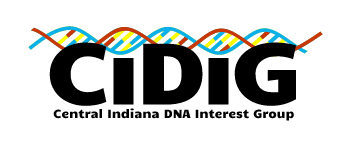The start of a new year generally means new goals, usually dealing with health goals or organizing one’s life in one way or another. If you’ve been thinking about how you could apply that to your genealogical research or want to try new things here are some suggestions for genealogy resolutions for 2020.

Photograph of Olive, Iris, Zula, Bernard and Eunice Chambers, children of Fred H. and Gladys (Sinnett) Chambers from the Indiana State Library’s digital collections.
Back up your data
If you’ve been putting off backing up your genealogy research for “later,” 2020 is a good year to tackle backing up your research. Losing genealogy data due to a hard drive crash or from an unexpected event like a house fire can be devastating. Whether you decide to back up your information in the cloud or with a hard drive keeping copies of your research in different places will help eliminate the chance of massive loss of one’s research.
Visit an institution that you have not been to before
As most researchers realize after doing genealogy research for any amount of time, not everything is available on the internet. Many materials can only be accessed in a library, archives or other local organizations since they are often under copyright and cannot be digitized. Often, regional or local institutions may have materials relating to local families in the area that larger institutions don’t have in their collections. Taking the time to visit area libraries or historical societies where your ancestors lived may yield new information or new clues if you’ve hit a brick wall.
Attend a genealogy conference
Attending a conference is a great way to pick up tips and new research techniques. Many regional and national conferences offer a wide variety of topics and presenters for a fairly reasonable price. Or perhaps attend a conference with a more narrow focus, generally on one specific topic or field of genealogy.
Some larger conferences offer a virtual pass, where, for a reduced rate, you can watch a selection of talks from the comfort of your home. The National Archives has a yearly Virtual Genealogy Fair that is free, the videos are available on YouTube and you can download the handouts to your computer.
Take a DNA test
Genetic genealogy has become a popular area of research. DNA kits from Ancestry and 23andMe are popular gifts for people wanting to learn more about their ethnicity or to connect with family members. The three big companies are the aforementioned Ancestry DNA and 23andMe, along with MyHeritage. For more information about the field of genetic genealogy check out the International Society of Genetic Genealogy.
Prioritize your resolutions
After you’ve created a list of things you would like to accomplish go through and identify the ones you want to tackle first. Perhaps you weren’t able to get through everything you wanted to last year, or you have one goal you really want finish, like scanning and organizing your family photos and other genealogical materials. Create realistic goals and timelines for completing each task, and have a plan in place on how you are going to accomplish everything you want to finish in the coming year.
Blog written by Sarah Pfundstein, genealogy librarian, Indiana State Library. For more information, contact the Indiana State Library at 317-232-3689 or “Ask-A-Librarian.”

